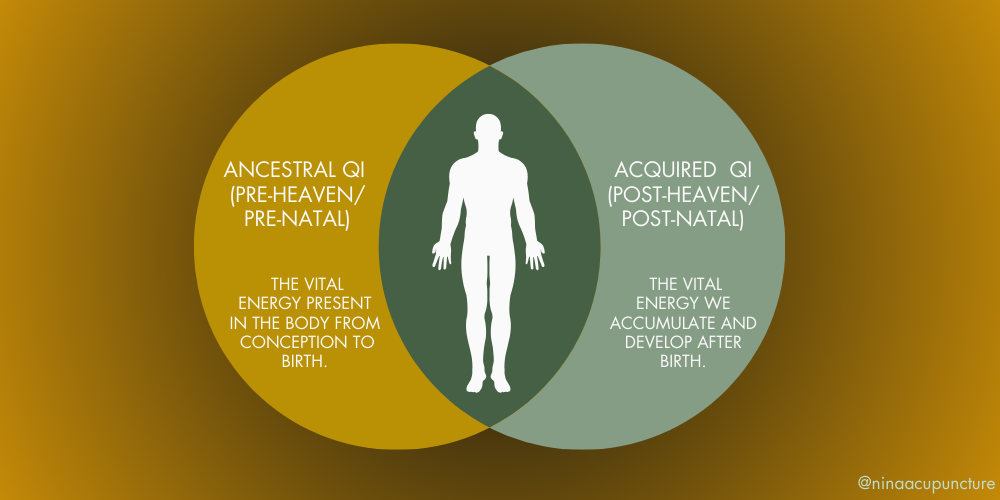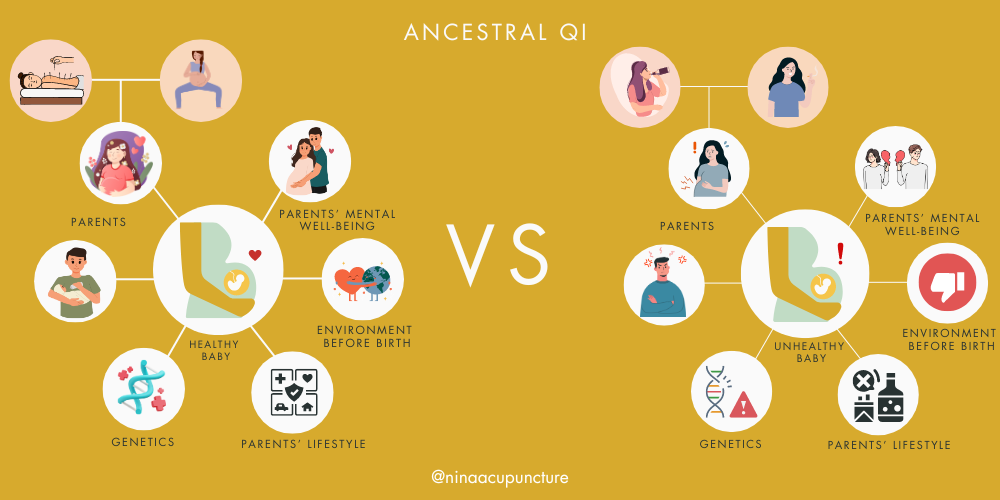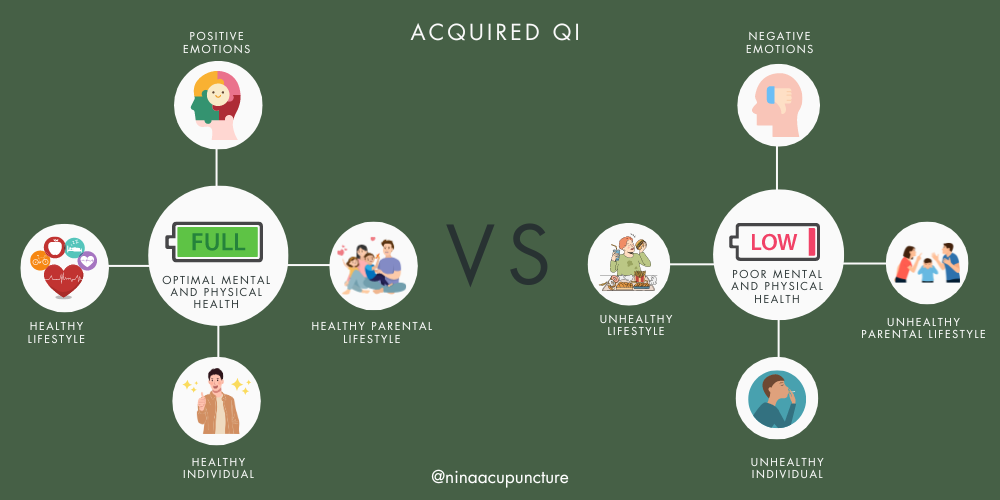Source of Your Energy
Written by Nina Jatuparisuthiseen, L.Ac., LMT, C.SMA
There are two sources of Vital Energy (Qi)
Ancestral (Pre-Heaven/Pre-Natal), also known as Yuan Qi, is the vital energy present in the body from conception to birth. It is believed to be the foundation of all the Qi in the body and is responsible for the formation and development of the organs, tissues, and bones. Prenatal Qi is said to be inherited from our parents and is considered to be a finite resource that we have to manage carefully throughout our lives. It is said that the quality and quantity of Prenatal Qi can be influenced by the health and lifestyle of our parents, especially during pregnancy. Maintaining and nurturing Prenatal Qi is essential for overall health and well-being.
Ancestral (Pre-Heaven/Pre-Natal) Qi comes from
birth = Battery -> one and done -> cannot change.
Acquired (Post-Heaven/Post-Natal), also known as acquired Qi, is the vital energy we accumulate and develop after birth. It is derived from the air we breathe, the food we eat, and the experiences we have in life. Post-natal Qi is believed to be renewable and can be replenished through exercise, proper nutrition, and other healthy habits. Our emotions and mental state also influence Post-natal Qi. Negative emotions like stress, anger, and anxiety can deplete our Qi, while positive emotions like joy and contentment can help to strengthen them. It is essential to maintain a balance of Post-natal Qi to achieve optimal health and vitality.
Acquired (Post-Heaven/Post-Natal) Qi comes from
after birth -> Air, Food, Water, Environment, and Lifestyle = Gasoline -> refillable -> changeable.
Pre-heaven Qi is believed to be largely "genetic" that we inherit from our parents, while the concept of "post-heaven qi" in traditional Chinese medicine refers to the energy that a person acquires after birth through their environment and lifestyle. Similarly, the term "epigenetic" refers to changes in gene expression that are caused by factors outside of an individual's genetic code, such as diet and environmental factors. So, one could say that epigenetic changes are a manifestation of post-heaven qi in the body.
Together, the Qi we inherit, and the Qi we absorb from our food determine our general state of health.
What kind of car do you have?
What kind of driver are you?
Imagine you have one car in your lifetime; how many miles per hour will you drive day in and day out? How long do you want this car to last?
Genetic - Ancestral (Pre-Heaven/Pre-Natal) - Battery
How old were your parents when they had you? Before or after 28 years old.
Do you have siblings? What number are you?
What is the health of your parents? Do they have any genetic disorders?
Did your parents eat a nutritious diet?”
Were they experiencing abnormal levels of stress?”
What kind of environment did your parents live in?
Epigenetic - Acquired (Post-Heaven/Post-Natal) – Gasoline
What is your diet?
What is your Body Mass Index? Are you overweight?
Do you complete sufficient levels of physical activity?”
Do you have enough good quality sleep?
Do you smoke or use any additional substances?
Do you often drink alcoholic beverages?
Do you live in environmental pollutants?
Are you able to manage your psychological stressors?
Are you working on the night shift or living your life opposite to the sun?
See where you are and take care of yourself accordingly. You can't change the genetics (Pre-heaven Qi) that you already have, but you can adjust your epigenetics (Post-heaven Qi). Live wisely; the power of your health is in your hands, and make the right choices.
References
Roseboom T., Epidemiological evidence for the developmental origins of health and disease: effects of prenatal undernutrition in humans. J Endocrinol 2019. 242:T135-T144
McCartney D, Stevenson A, Hillary R, et al., Epigenetic signatures of starting and stopping smoking. EBioMedicine 2018; 37:214-220
Centers for Disease Control and Prevention. (2014). What is Epigenetics? https://www.cdc.gov/genomics/disease/epigenetics.htm.
American Congress of Obstetricians and Gynecologist. (2024). Having a Baby after Age 35: How aging Affects Fertility and Pregnancy. https://www.acog.org/womens-health/faqs/having-a-baby-after-age-35-how-aging-affects-fertility-and-pregnancy#:~:text=A%20woman's%20peak%20reproductive%20years,getting%20pregnant%20naturally%20is%20unlikely.




